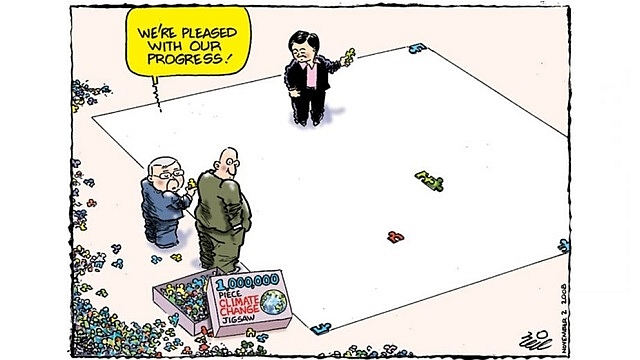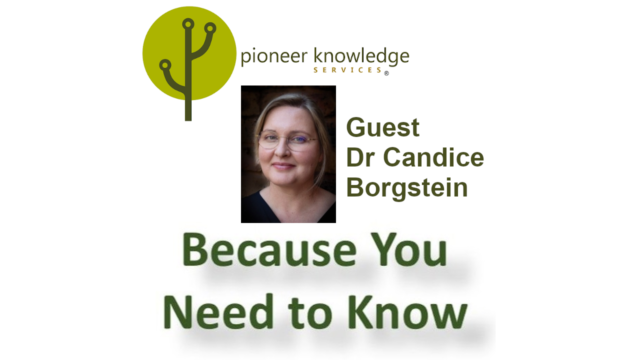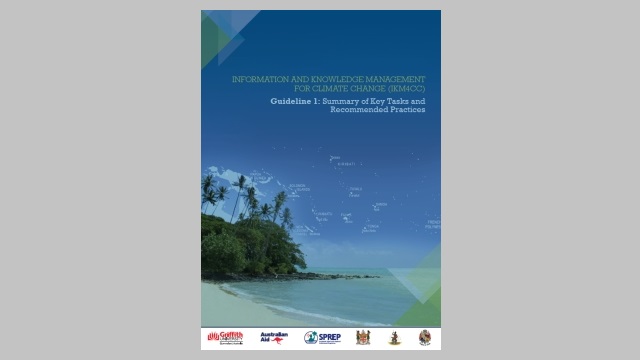
Actionable knowledge for climate progress
In my previous article, I asked “does climate change information matter?” This article asks, “since yes, can I find the information I need?”
The idea of actionable climate knowledge reflects the reality that an individual making a climate-relevant decision is doing so on the basis of her ability to answer the two questions that govern all human decision-making: “is it worth it,” and “can I do it?” Each of us uses different information to answer the two questions, and it has to be extracted from the information deluge that crashes over us every day.
Here’s a great (non-climate) example of information that has been organized into actionable knowledge (thanks to Patrick McKercher):
Andrea, an accounts manager at an investment firm, wakes up to learn from CNN that an Asian banking scandal is strangling venture capital flows and causing loans to be called in prematurely.
Andrea accesses her company’s TheBrain™-based proprietary knowledge web to scan her company’s Asian partners and holdings. Clicking on the link to the Royal Bank of Hong Kong (RBHK), the hardest hit bank according to CNN, she is relieved to find that relatively few of her own clients are linked to RBHK, and that her company’s overall exposure to the crisis is modest.
She clicks through the knowledge web to show all clients with loans from the Royal Bank of Hong Kong that missed their financial targets in last 36 months, revealing just one client, Tsingtao Telecommunications. Pulling up her company’s current Asia strategy from the knowledge web she sees that Tsingtao is an important part of that strategy, and that Tsingtao is linked to other clients in Sweden, Indonesia, and South Africa.
Andrea then sets about using the knowledge web to help solve her client’s problem. She can see that Tsingtao switched its banking to RBHK from Cathay Bank four years ago. From her “people network” within the knowledge web she discovers that Alejandro (who graduated from the Haas Business School at UCB a few years after she did) now works at Cathay Bank. She calls Alejandro and finds out that after getting poor returns in real estate, Cathay wants to diversify and is interested in reclaiming lost customers. Cathay soon offers Tsingtao a bridge loan at very favorable rates, and Andrea receives a generous bonus at her next review.
Most of us are likely envious of the knowledge web Andrea was able to draw upon, and in fact knowledge management is big business. Andrea’s TheBrain™ software is actually in use by many Fortune 100 companies, and by agencies like the Department of Defense and the CIA dealing with wicked problems. Most of us, however, are more likely to create elaborate electronic file folder systems full of reports, news stories, and websites that we’re sure we’ll need in the future. A good substitute? Not even close, and when we do need information we’re often left searching the internet for “that great piece” we vaguely remember seeing six months before. Unfortunately, when it comes to a topic like climate change, almost any climate-related search term will generate millions of hits. That’s the antithesis of individual-specific actionable knowledge.
The actionable knowledge each of us might need is almost certainly out there. Woodrow Wilson supposedly said that “there is no idea in our heads that has not been worn shiny by someone else’s brain.” It’s a great quote, whoever said it. There’s almost no question that the internet holds what you need, already “worn shiny by someone else’s brain.” The problem is finding it! As reflected in knowledge management expert Carla O’Dell musing: “If only we knew what we know.”
Those simple seven words go a long ways toward explaining why we’re headed for between 3.5 and 6.0 degrees C of climate change, a level of change that will wreak havoc on the natural and managed systems upon which human societies depend. It’s not that the information and actionable knowledge we need to make better decisions about climate change doesn’t exist—we’re deluged with climate-relevant information. The problem is that the relevant decision-makers either never encounter “their” actionable knowledge, or have forgotten it by the time they have the opportunity to apply it.
Let me give you a personal example. I saw a news story that referred to the Carbon Pricing Leadership Coalition’s recent Report of the High-Level Commission on Carbon Prices. Since carbon pricing is an area of personal expertise, I figured I should track it down. The report sounded familiar, and when I found the document I even recognized its cover. But I had no recollection of whether I’d read the report.
The good news is that like Andrea and the CIA, I have a knowledge web built with TheBrain™ software. The Climate Web links together more than 1,000 books, 2,000 videos, 15,000 reports and articles, 25,000 news stories, 3,000 websites, 2,000 topical experts, as well as 10’s of thousands of individually extracted ideas and graphics. 1,500 index entries instantly take me to curated information on any climate topic, basically putting the entire topic of climate change into my short-term memory. Calling up the Report of the High-Level Commission on Carbon Prices, it turns out I had not only read it, but had linked 30 key ideas and graphics into the Climate Web’s Carbon Pricing Deep Dive. Replicate that thousands of times and you’ll have a sense of how the Climate Web beats Google for finding your actionable knowledge.
For a visual introduction to what I’m talking about, this video explores how the Center for Climate and Security’s recent report, Epicenters of Climate and Security: The New Geostrategic Landscape of the Anthropocene (an important report by the way) is integrated into the Climate and Security Deep Dive of the Climate Web.
In my previous article, I used the metaphor of a 1,000,000 piece jigsaw puzzle to represent the climate change challenge, and urged people really wanting to make a difference on climate change to go to “climate puzzle school.” The Climate Web IS climate puzzle school, and we’ve kept it public access to facilitate more effective puzzle building (it is a VERY big puzzle!). The web-based version of TheBrain™ software through which you can access the Climate Web, however, is considerably less powerful than the desktop software. To accomplish the actionable knowledge miracles that Andrea was able to, or that we’re able to with the Climate Web, you’d want to develop your own knowledge web “fitted” to your own brain.
If you’re working on climate change, however, we can greatly simplify the process. We can package and export modules from the Climate Web to help you construct your own knowledge web, saving you hundreds or even thousands of hours. After that you’re free to take your knowledge web in any direction that makes sense for you, or we can support the process through the software’s TeamBrain™ version.
Helping you build your own knowledge web is just one of many ways the Climate Web can help advance your climate-relevant goals. Whether you’re an individual, a business leader, a researcher, a journalist, a philanthropist, or a consultant/lawyer, the Climate Web is an unparalleled actionable knowledge resource for climate issues, climate risks, and climate solutions. What if you could individually know what we collectively know when it comes to climate change, and zero in on your actionable knowledge? If you’re involved in any way with the 1,000,000 piece climate change jigsaw puzzle, you should take advantage of the Climate Web.
Header image source: 1,000,000 Piece Climate Change Jigsaw (Neil Matterson, 2008), National Museum of Australia.





